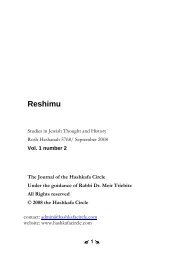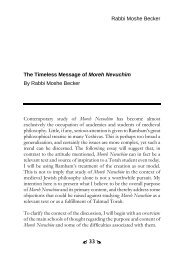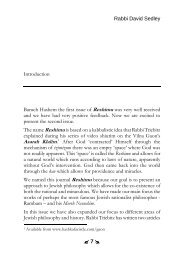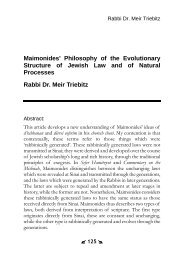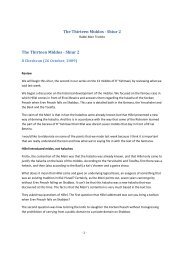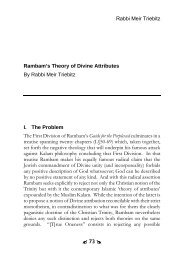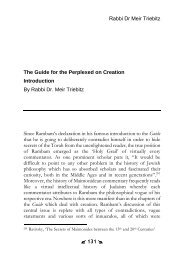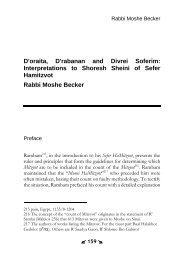Reshimu_3_journal_no.. - Hashkafa Circle
Reshimu_3_journal_no.. - Hashkafa Circle
Reshimu_3_journal_no.. - Hashkafa Circle
Create successful ePaper yourself
Turn your PDF publications into a flip-book with our unique Google optimized e-Paper software.
Rabbi Moshe Becker<br />
the “hora’ah” of R’ Ashi and his generation, he never explicitly states<br />
that R’ Ashi compiled or wrote the Talmud. 13<br />
However, the idea that R’ Ashi created or compiled an entirely<br />
original work is problematic. The implication of many, many<br />
instances in the Gemara is that a ca<strong>no</strong>nized body of Talmudic<br />
k<strong>no</strong>wledge was already in use during the generations preceding R’<br />
Ashi. Halevy points out many of these instances, and I will<br />
reproduce several below.<br />
The important factor to be aware of in these passages is what is<br />
k<strong>no</strong>wn as the “stama de-gemara”, the narrative or passive voice of the<br />
Gemara. Many passages in the Gemara contain a<strong>no</strong>nymous<br />
statements of a narrator as well as quotes attributed to Amoraim by<br />
name. Halevy points out that the key is to carefully separate these<br />
two components. If we can establish that a part of the narrative<br />
preceded the Amora who is quoted by name, we must assume that<br />
some form of the Talmud had been compiled earlier, and the Amora<br />
in question is in fact commenting on this existing form. Examples of<br />
this can be seen in many Gemaras.<br />
In one example 14 , we find R’ Ashi and Ravina themselves discussing a<br />
seemingly preexisting passage: The Gemara 15 discusses the case of an<br />
individual who mistakenly ate two olive-sized pieces of forbidden fat.<br />
He then found out that one of the pieces was forbidden, and at a<br />
later point found out that the second was forbidden as well. The<br />
question in the Gemara is how many sin-offerings such an individual<br />
is required to bring 16 . R’ Yochanan says that the person must bring<br />
13 ‘Hora’ah’ can be translated in several ways, and I believe that R’ Sherira Gaon<br />
understood it differently than Rashi and influenced Halevy in this respect. I will<br />
return to this point later.<br />
14 Dorot HaRishonim II p. 55<br />
15 Shabbat 71b<br />
16 As a rule, the obligation to bring a korban chatat only occurs after one becomes<br />
aware of his transgression, and as such, an individual who mistakenly committed<br />
the same sin multiple times over a long period of time would only bring one korban<br />
15



